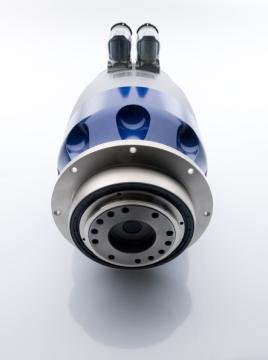The TPM+ power is available in a single-stage version - an especially attractive alternative for linear rack-and-pinion applications - or as a two-stage actuator for rotary drive tasks. The reduction ratio steps are relatively small to facilitate an actuator design characterised by optimal energy efficiency and dynamics. The decision to employ helical toothing in the gearhead permits significantly smoother running at the output. The influence of meshing frequencies is minimised and the overall noise level is 6 dB lower than with the straight-toothed predecessor gearhead series.
The permanent magnet synchronous motors developed by WITTENSTEIN motion control offer remarkable power density. In addition to the use of rare earth magnet material, this is mainly due to the higher pole number and the copper fill factor in the slots. At the same time, the high quality of the thin sheets in the stacks helps optimise the power balance by limiting losses due to eddy currents. Cogging - in other words, the permanent magnet detent toque between the rotor magnets and the stator pole shoes - is scarcely noticeable thanks to special geometric measures.
As far as the feedback systems are concerned, Igersheim drive specialist WITTENSTEIN trusts in the tried-and-tested technology of rugged resolvers and the precision of optical encoders using the EnDat and Hiperface protocols. A backlash-free permanent magnet brake is optionally available.
The new TPM+ power hails from the same creative stable as the TPM+ dynamic. In addition to a surface that is less sensitive to dirt than ever before, its tremendously powerful build clearly emphasises the product's impressive features.
The new product makes a perfect complement to the proven TPM+ dynamic, which accomplishes its predominantly rotary drive tasks in robotics and packaging systems with admirable efficiency. The TPM+ power is set to leave a deep mark not only in highly dynamic, linear applications such as rack-and-pinions or ball screws but also as a rotary actuator in automation and machining plants, where it is required to handle heavy masses and high disturbance forces.

